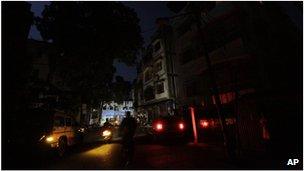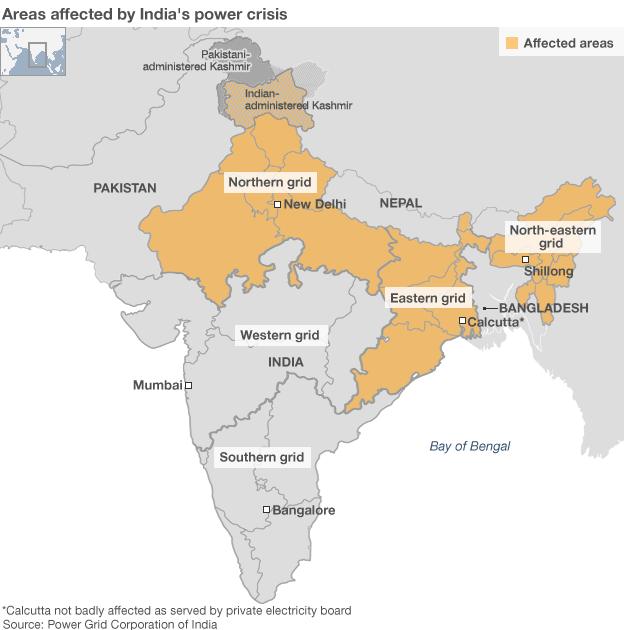Power restored after huge Indian power cut
- Published
- comments
BBC's Rajini Vaidyanathan: "Traffic lights here in Delhi don't have power"
India's power supply has been fully restored after a two-day blackout hit much of the country, officials say.
More than 600 million people were affected by the power cut after three electricity grids collapsed, one for a second consecutive day.
The power failure caused havoc, with whole cities grinding to a halt and transport and other services badly hit.
The breakdowns in the northern, eastern and north-eastern grids affected 20 of India's 28 states.
Power System Operation Corporation chief SK Soonee said electricity had been restored in all three grids overnight on Tuesday by engineers from the state-owned company.
The blackout caused chaos on transport networks with hundreds of trains stranded and water supplies interrupted.
In Delhi, Metro services were halted and staff evacuated trains. Many traffic lights in the city failed, leading to massive traffic jams.
Other areas affected included Punjab, Haryana, Uttar Pradesh, Himachal Pradesh and Rajasthan in the north, and West Bengal, Bihar, Orissa and Jharkhand in the east.
In the eastern state of West Bengal, around 200 miners were trapped underground as lifts failed, but officials later said they had all been rescued.
One shopworker in Delhi, Anu Chopra, 21, said: "I can understand this happening once in a while but how can one allow such a thing to happen two days in a row?
"It just shows our infrastructure is in a complete mess. There is no transparency and no accountability whatsoever."
'Technical snag'
In a statement on national TV on Tuesday evening, Power Minister Sushil Kumar Shinde blamed the crisis on states taking more than their quota of power from the national grid.

Streets in Calcutta were plunged into darkness as night fell
He said he had appealed to states to stop this and instructed his officials to penalise those states which did.
But officials in Uttar Pradesh, one of the states blamed in the Indian media, said there was "no reason to believe" they were at fault.
Anil K Gupta, the chairman of the state's power company, called for "further investigation to ascertain the real cause".
The power minister of Haryana state, Captain Ajay Singh, was <link> <caption>quoted by NDTV </caption> <url href="http://www.ndtv.com/article/india/power-regulator-summons-officials-from-five-states-blame-game-begins-249773?pfrom=home-otherstories" platform="highweb"/> </link> as saying his was not the only state with overdraw from the grid.
"We are not to be blamed for the technical snag that tripped the grid," he said. "We are simply being blamed for what everyone does."
Also on Tuesday it was announced that Mr Shinde had been promoted to the post of home minister, in a widely anticipated cabinet reshuffle.
He has been replaced by the current corporate affairs minister, Veerappa Moily.
Power cuts are common in Indian cities because of a fundamental shortage of power and an ageing grid - the chaos caused by such cuts has led to protests and unrest on the streets in the past.
But the collapse of an entire grid is rare - the last time the northern grid failed was in 2001.
India's demand for electricity has soared in recent years as its economy has grown but its <link> <caption>power infrastructure</caption> <altText>link to article on power</altText> <url href="http://www.bbc.co.uk/news/business-19059213" platform="highweb"/> </link> has been unable to meet the growing needs.
Correspondents say unless there is a huge investment in the power sector, the country will see many more power failures.

- Published1 August 2012
- Published31 July 2012
- Published30 July 2012